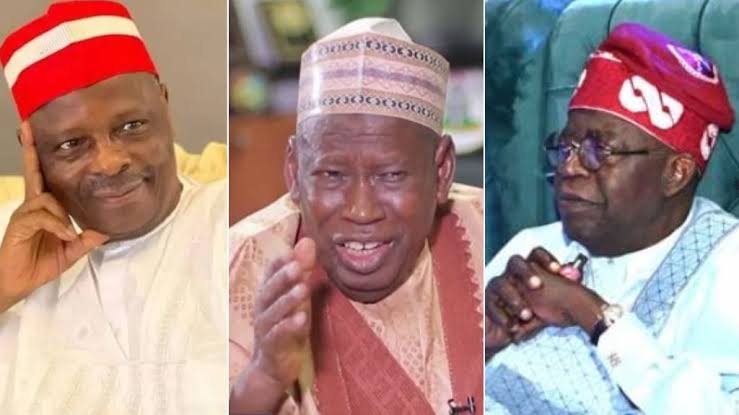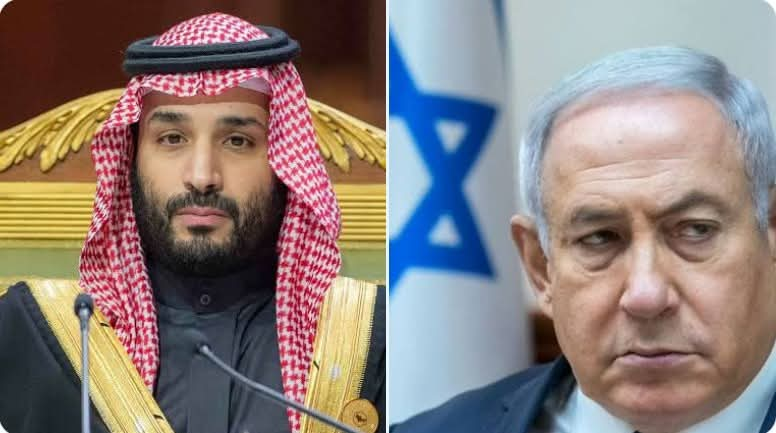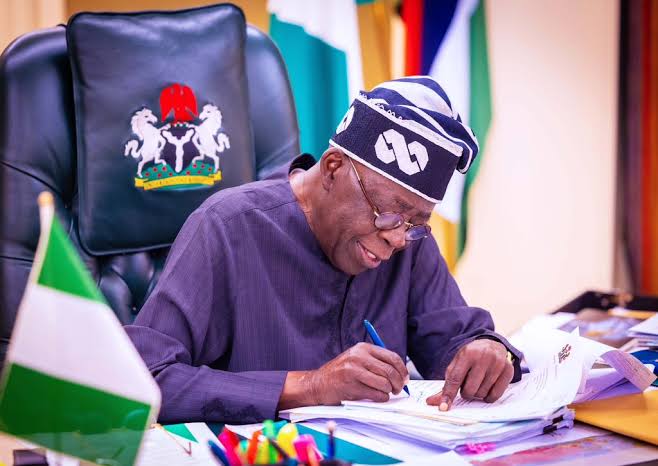The resignation of Dr. Abdullahi Ganduje as National Chairman of the All Progressives Congress (APC) has been linked to a political arrangement involving President Bola Ahmed Tinubu and former Kano State Governor, Senator Rabiu Musa Kwankwaso. The deal, according to insiders, is designed to pave the way for Kwankwaso’s entry into the APC in preparation for the 2027 general elections.
Ganduje officially stepped down on Friday, with the party naming Ali Bukar Dalori, Deputy National Chairman (North) from Borno State, as Acting National Chairman. His resignation comes amidst long-standing tensions with Kwankwaso, who is expected to join the ruling party under a new alliance brokered by Tinubu.
The APC National Publicity Secretary, Felix Morka, confirmed Ganduje’s resignation in a formal statement. Morka explained that the resignation letter was submitted through the party’s National Secretary, Ajibola Basiru. In the letter, Ganduje thanked President Tinubu for the opportunity to lead the party, citing gratitude for his support during his tenure.
However, multiple sources within the APC have indicated that Ganduje’s departure was driven more by political friction than personal health concerns, which was the official reason cited. The sources revealed that Ganduje had expressed his intent to resign as early as 3:00 p.m. on Friday, after news of the Tinubu-Kwankwaso arrangement began to circulate.
Efforts to persuade Ganduje to remain in office reportedly involved several high-ranking party officials, including Basiru. One source said, “We are currently pleading with him (Ganduje) not to resign. He is upset that Kwankwaso is coming to the APC. I think the two of them are sworn enemies. All the stakeholders are begging him to stay.”
Despite these appeals, Ganduje’s resignation was confirmed shortly after 4:15 p.m. on the same day. A senior party insider remarked, “He has eventually resigned. We couldn’t stop him. I think there is something personal between him and Kwankwaso, who is ready to join the APC after some discussions with the President.”
An APC staff member at the party’s national secretariat downplayed the situation, stating there was no crisis but acknowledging the gathering of members to discuss Ganduje’s departure.
The rivalry between Ganduje and Kwankwaso is deeply rooted in Kano politics. Both men were once political allies under the Peoples Democratic Party (PDP). Kwankwaso served as Kano’s governor from 1999 to 2003 and again from 2011 to 2015. Ganduje was his deputy during the latter term. Their political relationship deteriorated after Ganduje took over as governor in 2015 under the APC.
Their feud intensified over time, with one of the most significant points of contention being the 2020 dethronement of Emir Muhammadu Sanusi II, a known Kwankwaso ally. Sanusi’s removal by Ganduje’s administration was widely seen as politically motivated. In a dramatic reversal, Sanusi was reinstated as Emir of Kano on May 23, 2024, by NNPP Governor Abba Yusuf, who operates under Kwankwaso’s political influence.
Although Ganduje cited medical reasons for his resignation, political analysts and observers interpret his move as a direct response to the President’s outreach to Kwankwaso. This maneuver is viewed as a strategic effort by Tinubu to consolidate political forces ahead of the 2027 elections.
Further commentary came from Buba Galadima, a close associate of Kwankwaso, who said he was not aware of any formal defection plan. However, Galadima acknowledged that significant political moves were underway within the APC.
“I am not aware of the defection plan. However, I know Kwankwaso and Ganduje have personal issues. I am equally aware that there was a meeting of APC stakeholders and the presidency three days ago where they agreed that Ganduje and Shettima should be sacrificed to bring a new set of people into government and the party,” Galadima revealed.
President Tinubu, who assumed office in 2023, is reportedly recalibrating the party’s leadership to prepare for the next electoral cycle. As part of this strategy, there are indications of a broader effort to reshape the party’s internal dynamics and widen its appeal.
Meanwhile, the opposition is also mobilising in anticipation of the 2027 elections. Key figures such as Atiku Abubakar of the Peoples Democratic Party and Peter Obi of the Labour Party are reportedly exploring coalition possibilities aimed at unseating the ruling APC.
The full implications of Ganduje’s resignation remain to be seen, but it marks a significant shift in the internal politics of the APC. With Kwankwaso’s possible entry into the party and Tinubu’s behind-the-scenes maneuvering, the political landscape ahead of 2027 is already beginning to take shape.





